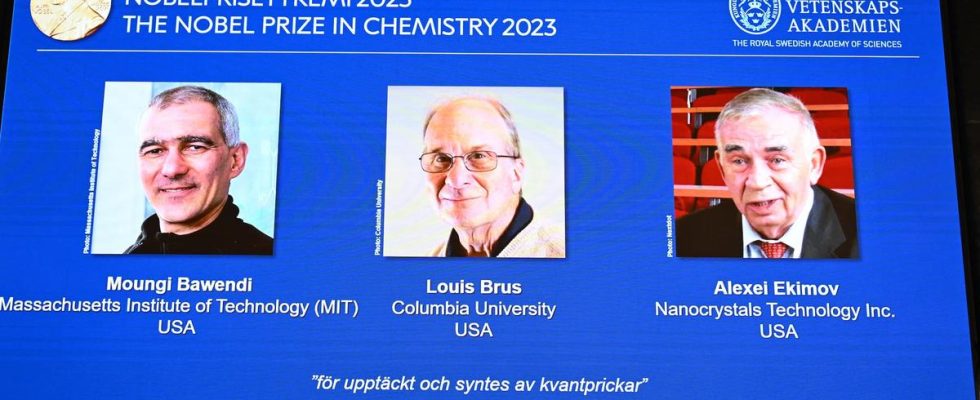” data-script=”https://static.lefigaro.fr/widget-video/short-ttl/video/index.js” >
The 2023 Nobel Prize in Chemistry is awarded to Moungi Bawendi, of the Massachusetts Institute of Technology, Louis Brus of Columbia University, and Alexei Ekimov, of Nanocrystals Technology, “for the discovery and synthesis of quantum dots”.
The 2023 Nobel Prize in Chemistry was awarded on Wednesday to a trio of Americans composed of Moungi Bawendi, Louis Brus and Alexei Ekimov, born respectively in France, the United States and the USSR and all three working in the United States on nanoparticles.
The committee rewarded the work on “the discovery and development of quantum dots, nanoparticles so small that their size determines their properties”, according to the jury. The winners, whose names had leaked to the Swedish press a few hours before the official announcement, were distinguished “for the discovery and synthesis of quantum dots“.
Quantum dots, also calledquantum dots”, or “quantum dots” in English, are semiconductor nanocrystals, generally 2 to 10 nanometers in diameter. Capable of converting an incoming spectrum of light into a different energy frequency, they are used in modern LED television screens, in solar panels and in medical imaging, where they can notably guide surgeons in the ablation of tumors. In “classical” chemistry, molecules are used, the composition of which determines their properties. With quantum dots, it is no longer the composition of the structures, but their size that induces particular properties. By varying the size of such a nano-structure, we can make it emit light of any color.
Alexei Ekimov and Louis Brus had each discovered the properties of these tiny structures in the 1980s, and it was Moungi Bawendi who invented the process in 1993 to produce them reliably, by very finely controlling their size. , crucial for determining their properties.
Alexei Ekimov, 77, began his career in the USSR, and has been based in the United States since 1999. Louis Brus (79) worked at Bell Laboratories when he carried out his Nobel-winning work, before joining the Columbia University in New York. Moungi Bawendi was born in Paris in 1961, the son of Tunisian mathematician Mohammed Salah Baouendi and Hélène Bouendi (née Bobard), and he grew up in France and Tunisia before his parents settled in the United States in 1976. Like his father, he took American nationality and is a professor at the Massachusetts Institute of Technology (MIT).
The names had leaked
A few hours before the official proclamation, the names of the researchers were published in error, several Swedish media reported, citing a press release from the Academy which was no longer online on the site at the start of the morning.
“I’m trying to understand what happened. We haven’t made a decision yet, so if a press release came out, it’s a mistake», declared an expert from the Nobel chemistry committee at the Academy, Heiner Linke, to the Swedish daily Dagens Nyheter.
The leaking of Nobel names is rare, with the Academies responsible for choosing the winners taking care to keep their debates secret. The list of nominees is also secret for 50 years.
” data-script=”https://static.lefigaro.fr/widget-video/short-ttl/video/index.js” >

